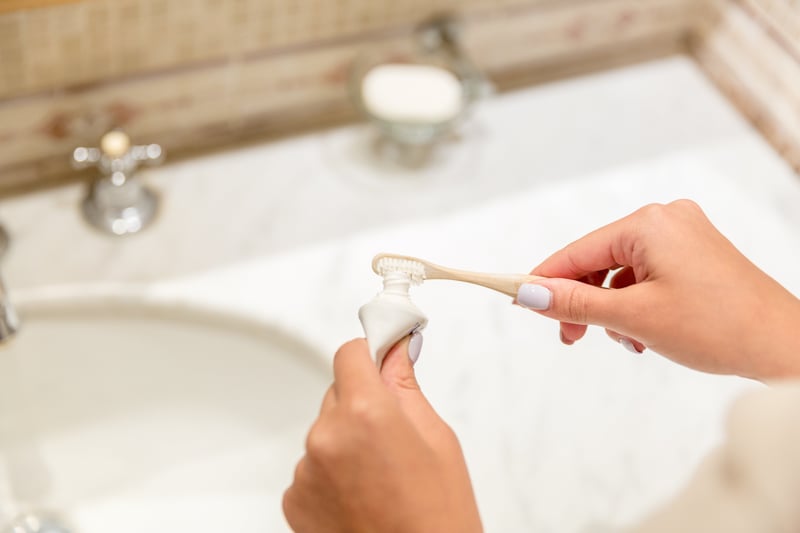Submit your contact info here or click the "Contact me about Sync" button below and we will reach out to you with more information.
Get Healthy!

- Sarah D. Collins
- Posted July 18, 2023
Fluoride Toothpaste, Make Room for a New Competitor
Fluoride may have found its match in preventing cavities.
New research shows that toothpaste containing hydroxyapatite, one of the main mineral components in teeth, can prevent cavities as effectively as fluoride, which has been used in toothpaste since 1956.
The findings were published July 18 in Frontiers in Public Health.
"If the article is correct based on the data, one might choose the hydroxyapatite over the fluoride, because the hydroxyapatite itself is safer than fluoride,"said Dr. Leonard Patella, a dentist with Northwell Health in Glen Cove, N.Y., who was not involved with the study. "If you give too much fluoride, it can be toxic. And too much fluoride, if ingested, can cause damage to teeth. It can cause something called fluorosis."
Dental fluorosis is a condition that changes the appearance of tooth enamel and can happen when children consume fluoride during their teeth-forming years. In places like the United States, cases are typically fairly mild and usually result in white or brown spots on the teeth. In more severe cases, however, pits can form.
"This is a very important issue,"said researcher Dr. Elżbieta Paszyńska, head of the department of integrated dentistry at Poznań University of Medical Sciences in Poland. "Unlike fluorides, hydroxyapatite has a high remineralization effect, biocompatibility, and is safe if accidentally swallowed. Dentists worldwide should be informed about hydroxyapatite to be a safe and efficient alternative to fluorides for daily oral care."
For their research, her team enlisted 171 patients in an 18-month trial, with an aim that none would have an increase in cavities by the study's end. Patients were evenly split, half brushing twice per day with hydroxyapatite toothpaste and half brushing twice per day with fluoridated toothpaste. They were asked to brush at the same time every day with an electric toothbrush. They had a dental exam every six months.
At the end of the trial, 89.3% of the hydroxyapatite group and 87.4% of the fluoride group had no new cavities. Both toothpastes worked equally well, the findings showed.
But whether hydroxyapatite will steal fluoride's crown for most popular mineral in dental health remains to be seen.
Caries, the beginning of tooth decay, are the result of bacteria attacking the surface of the tooth, said Dr. Janet Moradian-Oldak, a professor of dentistry and biosciences/bioengineering at the University of Southern California.
"When you eat too much sugar, the bacteria uses the sugar, metabolizes it, and then creates acid, and that acid dissolves the enamel of the tooth," she explained. "And if you don't have good dental hygiene, if you eat acidic food, if you don't brush your teeth, and if dissolving the mineral is faster than rebuilding the mineral in your saliva, that eventually leads to cavity."
Fluoride basically slows demineralization, Moradian-Oldak said.
"They're basically protecting the tooth from dissolving too fast," she explained, adding "this is the cheapest way to prevent progression of dental caries."
Hydroxyapatite toothpaste, on the other hand, is more expensive, a Google search shows. Prices range from $11 to $18 for hydroxyapatite toothpaste and between $2 to $5 for fluoride toothpaste.
It's also worth noting that this study looked only at dental caries, and not how hydroxyapatite affects more severe issues like cavities.
But, for people who are anti-fluoride, this could be the ideal alternative, Patella said.
"There are a lot of patients, kids, parents who say we don't want fluoride, so they use non-fluoridated toothpaste -- and by itself, non-fluoridated toothpaste is not as effective in protecting the teeth,"he said. "You're cleaning the teeth, you're removing the plaque, but you're not protecting the teeth, making them stronger as it happens with fluoride. So in this case, if someone is completely against fluoride, and now they have an alternative that could prevent children from getting cavities, I think it's a great solution."
More information
The U.S. Centers for Disease Control and Prevention has more about oral hygiene.
SOURCES: Elżbieta Paszyńska, DDS, MSC, PhD, head, department of integrated dentistry, Poznań University of Medical Sciences, Poznań, Poland; Janet Moradian-Oldak, MSc, PhD professor, dentistry, and professor, biomedical sciences and bioengineering, University of Southern California, Los Angeles; Leonard Patella, DDS, chairman, dental medicine, Northwell Health Glen Cove Hospital, Glen Cove, N.Y.; Frontiers in Public Health, July 18, 2023







